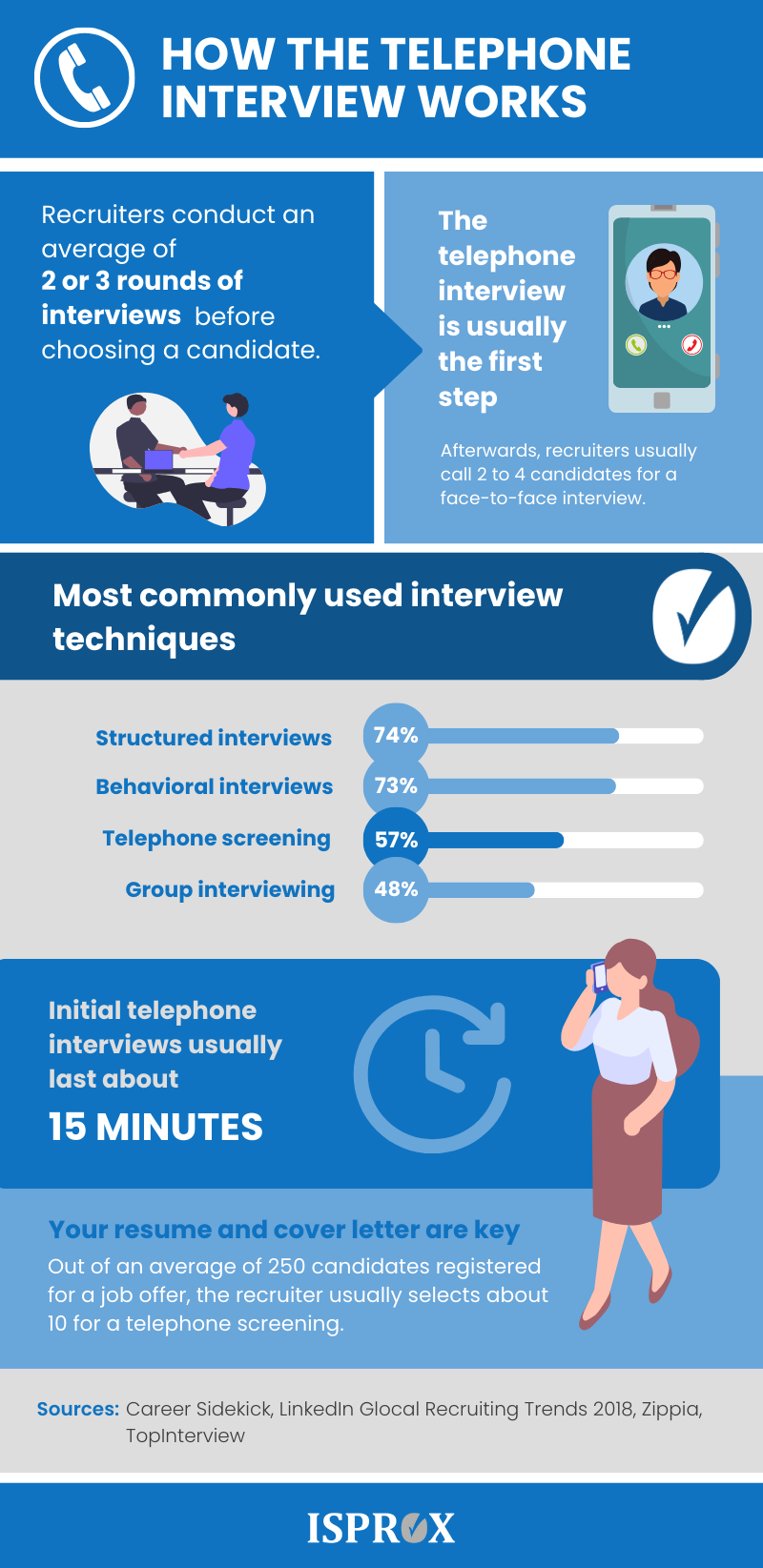Are you actively searching for a job? Recruitment processes are changing. Technology is having a major impact, so you need to learn how to deal with alternative communication channels. Among them, the phone interview is becoming more and more common. Are you ready to succeed?

Content
According to a TechUk survey, 58% of people want to improve their digital skills. In many cases, they want to access a better job or increase their chances of being chosen. But does this scenario include telephone contact? You should know that it is becoming a preferred tool during the interview process for job candidates. Therefore, you need to be good at this type of communication.
There is another interesting US study, this time from the Federal Reserve Bank of Boston. It found that workers who have been unemployed for more than six months have a harder time getting out of that situation. In other words, if you are unemployed, you have to be fast and smart.
Finally, Zety's data shows that between 30 and 50 resumes must be sent out before a candidate is hired. Take a look at this average data, it is certainly revealing:
When this process includes a telephone interview, the lack of habit and specific preparation tends to reduce these percentages. It is true that we are all used to talking on the phone. But are we really able to persuade and inspire our interviewers?
Although we all make phone calls on a regular basis, we are not used to doing so under the pressure and demands of a job interview.
In most cases, the phone call becomes the filter before the in-person interview. It allows you to quickly identify and eliminate candidates who do not fit the profile you are looking for.
They are usually short, between five and ten minutes. They focus mainly on the analysis of the curriculum and its content. They almost always have a very clear purpose: to confirm the candidate's suitability.
Do not underestimate its importance, because it is the key for you to continue in the process or not. In this sense, it will be your first opportunity to seduce the company where you want to work.
Are you looking for a new job challenge?
Register your CV, and from ISPROX, we will contact you if any vacancy matches your profile.
We do not think it is so important to talk about the advantages and disadvantages of this kind of communication, what is really important is to know its characteristics. It depends on your preparation and attitude to make these characteristics positive or negative. You must adapt to its nature in order to shine and express your full potential.
Keep these factors in mind:
Albert Mehrabian, professor at the University of California, is the author of a mythical study on personal communication. His work allowed him to formulate, in 1967, the famous and very useful rule 55-38-7 on the importance of nonverbal language:
If we apply these conclusions to the specific case we are dealing with, the selection of personnel by telephone, the data have an impact. You have to achieve communication success with 45% of your resources, because body language disappears from the spectrum of influence. Your voice is therefore crucial.
To be successful on the phone, as in any communication, preparation and voice are key.
In all oral communication, the voice is the instrument par excellence that defines our personality and reinforces what we say. It is an element of impact, influence and power that must reflect security, confidence and enthusiasm.
However, there are two preliminary questions that you should consider:
In a telephone interview, it will be the key factor. What we say is not as important as how we say it. And, as we have just explained, intentionality is a priority. Your mood and inner conviction must support your conversational speech. Remember that your voice always shades your words with your emotions, and these are the words that reach other people's hearts, or not.
Factors such as tone, volume, intensity and breathing can be worked on to improve your telephone communication. Also the content of your messages, which we will talk about in a moment. But the most important thing is how you feel about sharing information. Work from the inside out and you will transmit the necessary positive energy.
Remember, calls come when they come. You usually don't know recruiters are calling you until it's too late and they've introduced themselves. So if you are in the middle of a selection process, always answer every call with kindness, availability, and elegance. Maybe they're the ones.
In addition to this advice, you should apply other measures and habits that will help you increase your chances of success:
Be natural and be yourself on the phone with your recruiter. Being prepared will help you put your best foot forward.
Below are some common questions you will be asked during these phone interviews. You may be addressed as "usted" or "tuteo". Unless specifically asked, it is best to address the other party as "you. This is a time for respect, not trust.
Do not improvise, you must have prepared this answer. Be measured and sincere, without bragging unnecessarily, but mention and explain your value with honesty. Emphasize what you bring to the job. Having researched the company beforehand will also help you filter which attributes you should highlight about yourself.
Reinforce the idea that every educational experience has value and that, in your case, you took advantage of it. If you dropped out of college halfway through, see it as a test of character when you realized it was not for you. Remember, too, that the questions about your preferences are designed to measure your consistency with the job you are applying for. If you emphasize literature, art, or biology in an interview for an accounting or financial management position, you won't seem like a good fit.
It is important to listen carefully to the questions before deciding on the answer.
Be honest, based on what has happened. Flexibility is an increasing value, and we all know that these things happen. However, it is important that you have prepared this response: improvising can lead you to say outrageous things. If you badmouth your former employers, you're thinking that you can badmouth them, too. So never criticize your former bosses or colleagues. End your speech with a good or positive thing you learned from the situation.
Never speak ill of your former bosses or co-workers. Would you hire someone who criticizes people who have been important in your life?
There is something of a trap in these questions of a personal nature. It is not so much the content of the answer that matters, but the ability to deal with an unexpected situation. They are usually asked bluntly to change the pace and gauge your reaction. Answer calmly and positively. Again, it's not so much what you say as how you handle yourself.
Again, an answer that requires preparation. The information you have gathered will allow you to make the connection between their way of working and your personal style. Express your sincere interest in joining in win-win terms. Subtly demonstrate that you know what you are talking about and that you are a candidate ready to perform and add value.
Geographical mobility is highly valued by companies, so it is a positive factor in your application. However, if it is not feasible in your case, be honest. Make it clear why you are unable to do so under certain circumstances.
The content of a phone interview is little different from any other interview, such as an online interview. It is the context, the physical situation and the lack of body language that determine this communication. Prepare thoroughly, take care of your mood, and channel all your differentiating values into your voice and words.






Essential for basic site functionality and security. Always active.
Guardan tus ajustes como idioma o región.
Help us understand how you use the site (e.g., Google Analytics).
Allow personalized advertising and measure effectiveness (e.g., Meta/Ads).